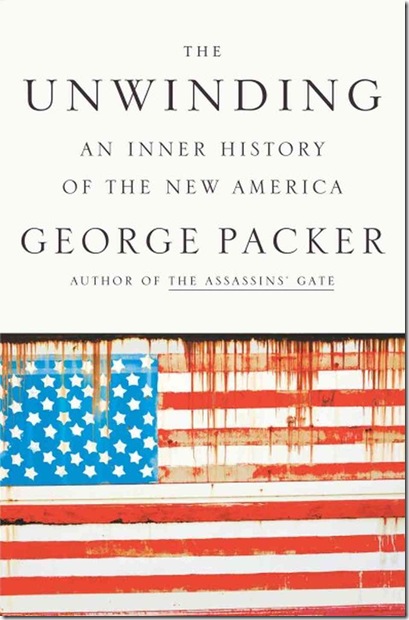 In his ambitious new book, George Packer describes the rise of “organized money” in business and politics and the collapse, or unwinding, of “the Roosevelt Republic that had reined for almost half a century.”
In his ambitious new book, George Packer describes the rise of “organized money” in business and politics and the collapse, or unwinding, of “the Roosevelt Republic that had reined for almost half a century.”
Packer’s nimble prose moves the story along, although the book suffers from disorganization and an odd mixture of short profiles of several celebrities and longer treatment of average people caught in the collapse of “the farms of the Carolina Piedmont, the factories of the Mahoning Valley, Florida subdivisions, California schools.”
The author skewers Newt Gingrich, Sam Walton and Joe Biden, while he lauds the accomplishments of Colin Powell and Elizabeth Warren. Bankers view Warren, now a Democratic U.S. senator from Massachusetts, as “the Devil incarnate” for her commitment to greater financial regulation.
Sam Walton became the richest man in America while “he and his company gave almost nothing to charity,” Packer notes. The combined wealth of six Walton family members grew to $23 billion, which equals the savings of the bottom 30 percent of Americans.
“Over the years, America had become more like Wal-Mart,” Packer writes. “It had gotten cheap. Prices were lower, and wages were lower. There were fewer union factory jobs, and more part-time jobs as store greeters.”
Packer’s reportorial skills shine as he returns several times to Tampa, using it as a sad example of the hardships endured when the out-of-control housing bubble burst. For decades the real estate gospel persuaded thousands of people to put aside common sense in pursuit of ever bigger profits. “At the peak of the madness, in 2005,” Packer writes, “a house in Fort Myers sold for $399,600 on December 29 and $589,900 on December 30.” So-called flippers were “driving prices to crazy heights.”
By the time real estate hit rock bottom in 2010, the euphoria had evaporated. Unemployment in Hillsborough County passed 12 percent. Middle-class families showed up in crisis centers and some slept in their cars.
When the Republican Party held its national convention last year in Tampa, “it was rare to hear anyone mention the foreclosure crisis, ghost subdivisions, robo-signing, mortgage fraud, bankruptcy, or homelessness.”
Packer’s unoriginal thesis is that in recent decades, as political and financial power became more concentrated, lower-and-middle-class Americans suffered. As symbols of that shift he describes the gradual decline in manufacturing and the birth of the Internet culture, as symbolized by California’s Silicon Valley, which concentrated extreme wealth in the hands of a few.
In the 1990s “the Internet replaced heaven, fortunes were made, everyday life with a mouse pad seemed kind of miraculous.” When eBay purchased PayPal for $1.5 billion, PayPal co-founder Peter Thiel walked away with $55 million on a $240,000 investment.
The structure of the book is awkward, with multiple chapters on the same few people scattered throughout. Dean Price, a North Carolina entrepreneur descended from a family of tobacco farmers, gets seven chapters.
Inspired by self-help books, Price is determined to start a biodiesel company. He proposes to supply biodiesel fuel to all the public school buses in North Carolina. One plan after another fails and Price eventually files for bankruptcy. On the final page of the book Price still dreams of building for himself “a great big house, a mansion … with geothermal heat and air-conditioning, and solar panels on the roof.”
As a staff writer at The New Yorker magazine, Packer has impeccable credentials. He won awards for his 2005 book The Assassins’ Gate: America in Iraq.
Packer has a reporter’s ear for nuance and relevance as he returns again and again to the profiled people, some of whom he first wrote about in The New Yorker. Although The Unwinding excels when Packer describes the struggles of average Americans, the individual stories do not add up to something larger, such as a compelling agenda for change.
The Unwinding: An Inner History of the New America; by George Packer; Farrar Straus and Giroux, 434 pp.; $27
Bill Williams is a freelance writer in West Hartford, Conn., and a former editorial writer for The Hartford Courant. He is a member of the National Book Critics Circle and can be reached at billwaw@comcast.net.